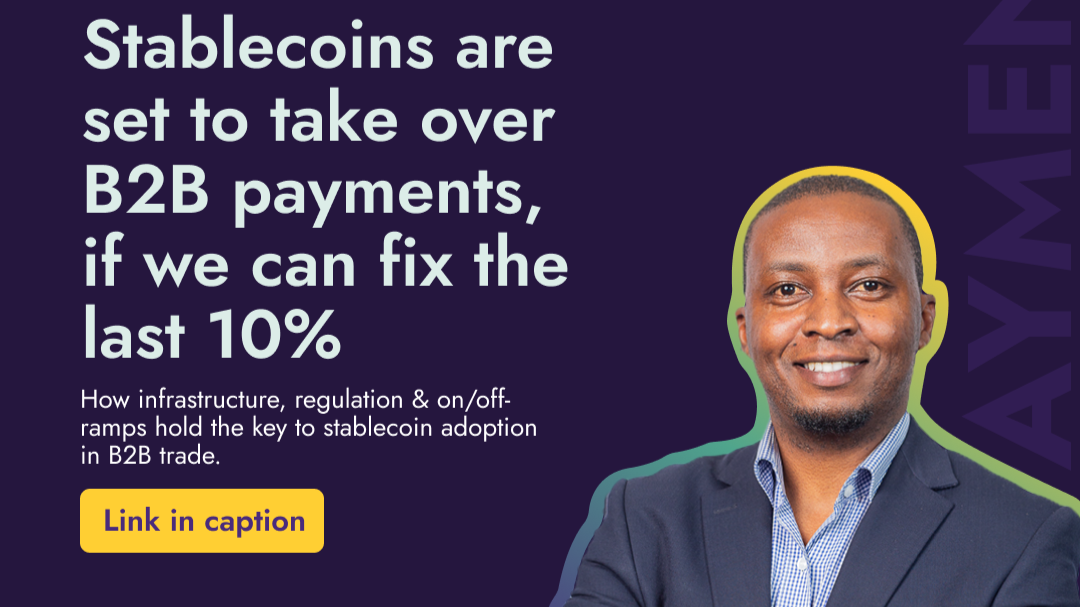Yellow Card, a leading cryptocurrency exchange in Africa, through its Kenyan Country Manager, Peter Mwangi, has stated that stablecoins are on the verge of transforming B2B payments, noting that one major challenge must be overcome before the innovation can go mainstream.
In a website post shared by Yellow Card on Wednesday, Mwangi explained that while the core technology powering stablecoins is sound and already changing the way some businesses transact, the real barriers now lie in what he described as the final 10 percent, infrastructure, regulation, and seamless on/off-ramps.
Stablecoins hold promise for cross-border B2B trade
Drawing parallels with the transformation impact of M-PESA on peer-to-peer mobile payments in 2007, Mwangi suggested that stablecoins have the potential to do the same for cross-border B2B transactions. This time, it’s not about the unbanked alone — it’s about businesses trying to navigate complex and costly global trade systems.
“At the heart of the Nairobi Central Business District, a middle-aged man runs a chain of automobile spare part retail shops in Kenya from his smartphone, connected to the global markets through stablecoins and B2B ecommerce,” the article states. “He has just paid his suppliers in China and Japan via stablecoins without leaving his shop.”
According to Yellow Card, this is no longer an isolated case. Tech-savvy non-crypto small and medium-sized enterprises (SMEs) and corporates across Africa are increasingly embracing stablecoins to settle cross-border payments, thereby sidestepping inefficient banking systems and currency volatility.
Africa’s B2B cross-border payments are currently burdened by high transaction fees, between six percent and 10 percent, and processing times that stretch to three to seven days.
Currency fluctuations only deepen the pain. For example, between August 2022 and August 2023, the Kenyan shilling lost 20 percent of its value against the U.S. dollar, disrupting businesses and trade.
“Several motor car importers in Kenya quoted prices in shillings faced renegotiations mid-shipment due to volatility of the shilling, disrupting operations,” Mwangi noted.
Furthermore, the company argues that stablecoins offer a compelling solution. “By settling transactions on the blockchain networks, they reduce fees to less than and enable 24/7 real-time settlements. For businesses this means predictability,” the article adds.
But as Mwangi points out, the path to widespread adoption is still blocked by the last 10% persistent challenges: regulatory uncertainty, interoperability, and a lack of trust and education.
“Africa’s regulatory landscape is fragmented. Clear frameworks are non-negotiable to mitigate risks like money laundering,” he explained. However, there has been progress in the past year. South Africa has introduced regulations for virtual asset service providers, Kenya is preparing to table a cryptocurrency bill, and Nigeria has made licensing mandatory for all digital asset players.
Interoperability remains another crucial factor. “Stablecoins must integrate with existing systems for seamless on and off-ramping into stablecoins. Without seamless integration between local payment methods and stablecoins, adoption will stall,” Mwangi stated.
Additionally, user trust and understanding of how stablecoins work must be addressed. “Some SMEs distrust stablecoins due to perceived risk of losing funds to scams. With proper education by ecosystem players, users in Africa can acquire knowledge on how to best protect their funds on the blockchain,” he added.
Calls for Yellow Card to integrate cNGN
As discussions about regulation and integration intensify, concerns have been raised about Yellow Card’s hesitance to integrate Nigeria’s regulated stablecoin, cNGN, into its payment stack.
“Now is the time for Yellow Card to do their part and integrate the cNGN into the payment stack,” Michael Gulewich, under the article on LinkedIn, noted. “Talking about needing all the pieces in place for payment integration on one hand and then wanting to wait until a stablecoin is a top traded commodity before listing isn’t benefiting the ecosystem.”
They argue that cNGN integration could enhance Yellow Card’s regulatory compliance efforts in Nigeria and protect the platform from future protectionist actions targeting U.S. dollar-backed stablecoins.
“The regulatory compliance piece for doing business in Nigeria will come a long way if you integrate cNGN usage. We never know what protectionist piece will happen regarding USD coin regulation,” the statement warned.
Toward an inclusive B2B payments future
While adoption is growing, Yellow Card acknowledges that more work must be done to close the gap. “There is still need for more regulatory clarity, and development of infrastructures for interoperability of stablecoins and local payments methods. Regulatory uncertainty in some markets, digital literacy gaps and digital asset taxation may slow down the adoption of stablecoins in Africa,” Mwangi cautioned.
Nevertheless, the company remains optimistic that stablecoins could follow the M-PESA blueprint to reshape African finance — this time on a cross-border business scale.
















